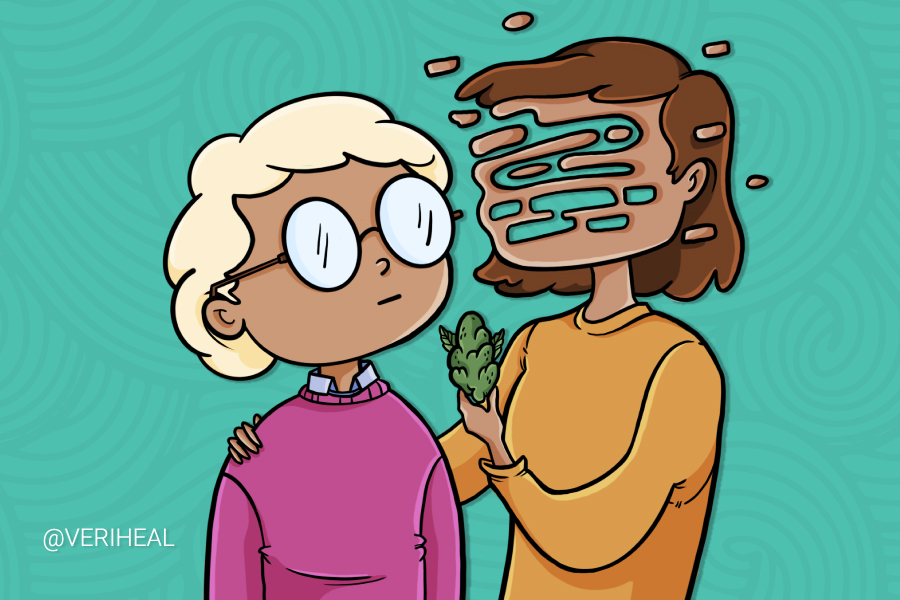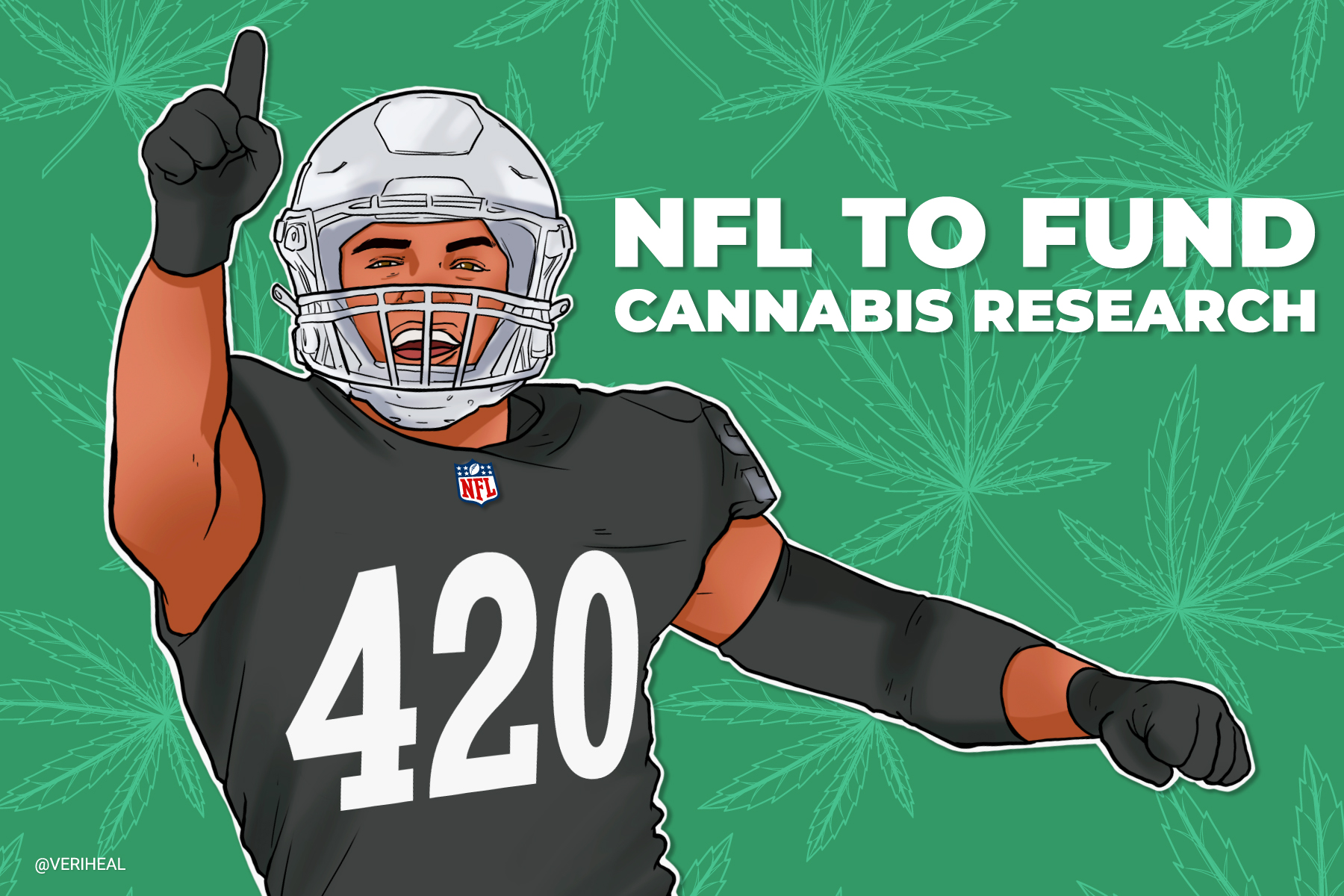Medical Cannabis for the Treatment of Dementia

- Dementia: Signs, Symptoms, and Types
- Causes and Complications of Dementia
- Dementia Treatment: Can Cannabinoids Provide Relief?
- The Role of the Endocannabinoid System in Treating Dementia
- What Preparations of Cannabis are Best for Dementia
- Talking to Your Doctor About These Types of Treatments
Good cognitive functioning is critical for quality of life, with the brain’s cognitive ability responsible for thinking, daily functioning and activities, judgment, comprehension, behavior and mood, spatial orientation, and remembering familiar faces and places. When cognitive functioning declines to the point that it disrupts a person’s life, they will be diagnosed with dementia until a specific diagnosis is determined, as there are many forms of dementia.
Based on the findings of the WHO 2022 report on dementia, an estimated 55 million people live with dementia worldwide today, with 10 million new cases every year (11). That works out to be one new case every 3 seconds. According to the WHO, dementia usually presents as a chronic and progressive syndrome.
The severity of dementia ranges from mild to severe. In mild cases, the patient might be unable to remember small things, whereas severe dementia usually results in a person becoming entirely dependent on others for simple living activities. In many cases of dementia, patients will lack control of their emotions, meaning their personalities may fluctuate. This can be tough for caregivers and lead to interpersonal, family, financial, and emotional conflicts that require professional mediation.
Medical researchers foresee the number of people with dementia exponentially rising to 78 million in 2030 and 139 million in 2050. Most patients reside in developing countries; over 60% live in low- and middle-income countries (11).
Only a handful of clinical trials have identified cannabis’ ability to control specific behavioral symptoms in people with dementia, such as agitation and aggression. A recent 2021 clinical review of these limited studies titled “Cannabinoids for Agitation in Alzheimer’s Disease” found that cannabinoids may relieve agitation by regulating neurotransmitters, improving comorbidities and circadian rhythms, plus increasing cerebral circulation (8).
Dementia: Signs, Symptoms, and Types
The signs and symptoms of dementia arise when formerly healthy neurons, otherwise known as nerve cells, stop functioning inside the brain. They may degrade due to a buildup of specific waste compounds (e.g., Aβ plaques) or certain physical or vascular injuries. Progressively, the connections between nerve cells and other brain cells diminish and eventually die.
Although most people lose neurons as they get older, the loss is usually much more significant for people diagnosed with dementia and goes beyond normal aging. Patients may experience some or all of the following signs and symptoms:
- Confusion, memory loss, and poor judgment
- Speech impairment
- Difficulty understanding and expressing thoughts
- Difficulty reading and writing
- Trouble paying bills promptly and managing money responsibly
- Impulsive behaviors
- Calling everyday objects strange words
- Asking questions repeatedly
- Feeling paranoid or experiencing hallucinations and delusions
- Losing track of surroundings and direction, e.g., getting lost in a familiar neighborhood
- Lack of empathy
- Balance and movement problems
- Taking a long time to finish essential tasks
- Losing interest in hobbies, activities, and social events
There are many different types of dementia. According to the WHO, Alzheimer’s disease is the most common and accounts for 60 to 70% of dementia diagnoses. Other commonly diagnosed dementias include vascular dementia, Lewy Body dementia, and frontotemporal dementia. Dementia can also result from stroke, brain infections (e.g., HIV, prions), and chemical or physical injuries caused by excessive alcohol drinking or repetitive concussive injuries (11).
Causes and Complications of Dementia
The causes of Alzheimer’s and related types of dementia vary based on the specific brain changes that occur, as mentioned above in the previous section. Even though research has spotlighted changes in the brain associated with some kinds of dementia, it continues to exponentially increase among the aging population as chronic and pro-inflammatory diets and diseases continue to increase. While age is a strongly correlated risk factor, it does not necessarily mean dementia is inevitable.
Scientists have learned that specific genetic mutations may prompt the onset of dementia in a reasonably small percentage of people. Young-onset dementia (diagnosed before age 65) occurs in 9% of the population. Environmental and lifestyle factors likely play a more prominent role than genetics in the development of dementia.
While there are no 100% proven methods of preventing the disease, doctors advise patients to lead a healthy lifestyle to minimize risk factors. It should be noted that certain risk factors are modifiable. Listed below are the 12 primary modifiable risk factors associated with dementia:
- High blood pressure
- Smoking
- Obesity
- Diabetes
- Harmful use of alcohol
- Lack of physical activity
- Depression
- Low levels of educational attainment and cognitive engagement
- Traumatic brain injury
- Social isolation
- Hearing loss
- Air pollution
- Poor diet
One of the main clinical complications in cases of advanced dementia relates to eating problems (6). Examples of common eating problems in dementia patients include oral dysphagia (e.g., storing food in the cheek), refusal to eat, being incapable of feeding oneself, and pharyngeal dysphagia, causing aspiration.
The other main clinical complication of advanced dementia is infections. These can occur anywhere — most commonly in the respiratory or urinary tract — and when someone cannot communicate pain or discomfort effectively, it can delay an infectious diagnosis. Thus, the caregivers’ role in preventing and promptly identifying infections is crucial, usually with proper monitoring and hygiene practices.
One of the most commonly reported causes of death among people diagnosed with dementia is pneumonia caused by a respiratory infection. Additional complications of untreated dementia range from reduced life expectancy and social anxiety to poor nutrition and loss of self-care.
Dementia Treatment: Can Cannabinoids Provide Relief?
Preliminary and small clinical evidence exists supporting the efficacy and tolerability of cannabis-derived cannabinoids as treatments for dementia-related symptoms. The real route to developing successful dementia treatments is through large-scale, randomized, and blinded ongoing clinical studies.
“Up to 90% of individuals with dementia experience neuropsychiatric symptoms (NPS),” reads an excerpt from “Cannabinoids for the Neuropsychiatric Symptoms of Dementia: A Systematic Review and Meta-Analysis (2).”
A systematic review and meta-analysis published in the Canadian Journal of Psychiatry emphasized that cannabinoids were well-tolerated, with “no serious treatment-related adverse events” reported.
“Treatment efficacy was associated with baseline dementia severity and dose, but not dementia subtype, age, or sex,” wrote the authors of the study, who noted that cannabinoid use led to noticeable improvements across NPS instruments, including the Cohen Mansfield Agitation Inventory, the Neuropsychiatric Inventory, and nocturnal actigraphy.
The results were replicated in “Prescription of a THC/CBD-Based Medication to Patients with Dementia: A Pilot Study in Geneva (3).” Testing the acceptability, practicality, and clinical outcomes of using a THC/CBD-based oral medical cannabis product in patients with severe dementia in Geneva.
A total of 10 female demented patients with severe behavioral issues were analyzed in this prospective observational study. Each of the women was administered oral CBD daily. The medication contained an average of 7.6 mg THC/13.2 mg CBD every day after two weeks, 8.8 mg THC/17.6 mg CBD after one month, and 9.0 mg THC/18.0 mg CBD after two months passed.
The THC/CBD-based oil was preferred. By analyzing the Neuropsychiatric Inventory and using the Cohen-Mansfield Agitation Inventory score in combination with a behavior problem visual analog scale, the researchers determined that the oral cannabinoid product contributed to a 40% reduction in symptoms after two months and reduced the rigidity score by 50%. Half of the patients successfully stopped or reduced the use of other psychotropic medications.
This limited data potentially means that caregivers may effectively use cannabinoids like THC and CBD to help control aggressive or agitated symptoms of dementia, along with sleep problems that are very common and difficult to deal with.
Treating dementia-related neuropsychiatric symptoms like these is very different from saying that cannabis is an approved treatment for any dementia, which it is currently not. Unfortunately, cannabis cannot yet be considered a cure, mitigating therapy, or preventative measure for any form of dementia.
The Role of the Endocannabinoid System in Treating Dementia
Memory formation and CB1 receptors maintain a strong connection. CB1 receptors are found in the body’s endocannabinoid system (ECS), which is in charge of achieving homeostasis – the steady state of maintaining essential bodily functions, including memory, mood, thinking, hunger, sleep, and libido. Endocannabinoids like anandamide, for example, are directly involved in memory formation (5).
When additional plant-based cannabinoids like tetrahydrocannabinol (THC) enter the body, they communicate with the ECS by binding to CB1 receptors in different brain regions. While direct CB1 activation causes a temporarily impairing high, it can also improve appetite in patients. Direct CB2 activation by THC can reduce neuroinflammation and oxidative stress in the brain. Consequently, behavioral functions associated with cognition are better modulated to manage proper cognition, emotional well-being, and stress.
A handful of studies have hypothesized that long-term cannabis use is associated with memory problems (7). Nonetheless, there is nothing to prove this explicitly in the long-term, nor is there solid evidence to suggest that cannabis oil (CBD oil) can halt the onset of, slow down the progression of, or reverse dementia.
What we can be sure of is that using medical marijuana that is rich in cannabidiol (CBD) may offer neuroprotection and neurogenesis in dementia-related cases (9). One study even went as far as to say that treatment with CBD can “improve cognitive processes including attention, executive function, working memory, and episodic memory in various pathological conditions including acute THC intoxication (4).”
Separate studies have shown how modulation of CB1 and CB2 can release neuroprotective effects without the recreational, or impairing, properties of Cannabis sativa (1).
Minor cannabinoids such as CBC and CBG may offer similar antioxidant and neuroprotective benefits through lighter activation of CB and other anti-inflammatory receptors (10). They are advantageously non-psychoactive and may contribute to the overall entourage effect.
What Preparations of Cannabis are Best for Dementia?
The use of cannabis doesn’t have to involve smoking. One of the main appeals associated with medical cannabis consumption is the diversity of product options. Various cannabis preparations are available for people with dementia, such as:
- Edibles
- Pills, capsules, and tablets
- Powder Cannabis
- Transdermal Patches
- Vapes
- Tinctures
- Rectal or vaginal suppositories
A note on these preparations for dementia patients from one of our cannabis coaches and writers, Dr. Abraham Benavides, MD:
Since people with dementia can have difficulty eating, finding a method that works well regularly for them is essential. Some forms of medical cannabis can be tricky for caregivers to administer and for patients to accept easily.
Tinctures are generally preferred and best tolerated, as they can be mixed into liquids or soft foods they love, such as yogurt or ice cream. It can also be advantageous by delivering both nutrition and cannabinoids at once. Small edibles like chocolate are excellent choices but don’t overdo the dosing. Suppositories can benefit people with advanced dementia or dysphasia who are no longer verbal or eating solid foods. Speaking with an experienced cannabis coach or a medical doctor can help you determine what forms and methods are best for your loved ones.
Talking to Your Doctor About These Types of Treatments
To better understand what type of dementia you are dealing with and determine whether or not your dementia is associated with a physiological condition, your doctor or healthcare practitioner may conduct a series of tests and imaging.
After a diagnosis, you can begin discussing the medical uses of cannabis-based treatment options with a doctor. However, it’s important to note that cannabis should not be used as a substitute for other doctor-prescribed medications.
Complementary Treatments Worth Discussing with Your Doctor
Some alternative therapies can benefit people with dementia by treating the conditions related to the disease, such as sleep disturbances or mood swings. Complementary medicine should be adopted alongside traditional Western medicine prescribed by your doctor.
Examples of complementary medicine include massage, meditation, biofeedback, tai chi, reiki, music therapy, guided imagery, and dietary supplements. You might also consider trying full-spectrum CBD or hemp oil to ease the symptoms of various forms of dementia. Currently, there is no evidence to show that cannabis or cannabis oil (CBD oil) can stop, reverse or prevent dementia. However, Some studies suggest cannabis could help to manage a few behavioral symptoms of dementia, such as agitation and aggression. CBN may be added to THC to help promote sleep.
If you or a loved one is considering using an FDA-legal synthetic cannabinoid product like nabilone to improve the behavioral symptoms of dementia, consult with a qualified healthcare professional beforehand. While the effects of cannabis can prove beneficial to mental health in older people and adult family members, you must continue using any medication(s) that your doctor prescribes.
Note: The content on this page is for informational purposes only and is not intended to be professional medical advice. Do not attempt to self-diagnose or prescribe treatment based on the information provided. Always consult a physician before making any decision on the treatment of a medical condition.
1. Abate, G., Uberti, D., & Tambaro, S. (2021). Potential and limits of cannabinoids in alzheimer’s disease therapy. Biology, 10(6), 542. https://www.ncbi.nlm.nih.gov/pmc/articles/PMC8234911/
2. Bahji, A., Meyyappan, A. C., & Hawken, E. R. (2019). Cannabinoids for the neuropsychiatric symptoms of dementia: A systematic review and meta-analysis. The Canadian Journal of Psychiatry, 65(6), 365–376. https://www.ncbi.nlm.nih.gov/pmc/articles/PMC7265608/
3. Broers, B., Patà, Z., Mina, A., Wampfler, J., de Saussure, C., & Pautex, S. (2019). Prescription of a THC/CBD-based medication to patients with dementia: A pilot study in Geneva. Medical Cannabis and Cannabinoids, 2(1), 56–59. https://pubmed.ncbi.nlm.nih.gov/34676334/
4. Curran, T., Devillez, H., YorkWilliams, S. L., & Bidwell, L. C. (2020). Acute effects of naturalistic THC vs. CBD use on recognition memory: A preliminary study. Journal of Cannabis Research, 2(1). https://jcannabisresearch.biomedcentral.com/articles/10.1186/s42238-020-00034-0#:~:text=Recent%20reviews%20suggest%20that%20CBD,THC%20intoxication%20
5. Letscher, E. (2018, November 12). The endocannabinoid system, our universal regulator. Journal of Young Investigators. Retrieved January 17, 2023, from https://www.jyi.org/2018-june/2018/6/1/the-endocannabinoid-system-our-universal-regulator
6. Mitchell, S. (2015). Advanced dementia. New England Journal of Medicine, 373(13), 1275–1277. https://www.ncbi.nlm.nih.gov/pmc/articles/PMC4685690/
7. NIDA. 2021, April 13. What are marijuana’s long-term effects on the brain?. Retrieved from https://nida.nih.gov/publications/research-reports/marijuana/what-are-marijuanas-long-term-effects-brain on 2023, January 17
8. Outen, J. D., Burhanullah, M. H., Vandrey, R., Amjad, H., Harper, D. G., Patrick, R. E., May, R. L., Agronin, M. E., Forester, B. P., & Rosenberg, P. B. (2021). Cannabinoids for agitation in alzheimer’s disease. The American Journal of Geriatric Psychiatry, 29(12), 1253–1263. https://www.sciencedirect.com/science/article/abs/pii/S1064748121000300
9. Valeri, A., & Mazzon, E. (2021). Cannabinoids and neurogenesis: The promised solution for neurodegeneration? Molecules, 26(20), 6313. https://www.ncbi.nlm.nih.gov/pmc/articles/PMC8541184/
10. Walsh, K. B., McKinney, A. E., & Holmes, A. E. (2021). Minor cannabinoids: Biosynthesis, molecular pharmacology and potential therapeutic uses. Frontiers in Pharmacology, 12. https://www.ncbi.nlm.nih.gov/pmc/articles/PMC8669157/
11. World Health Organization. (n.d.). Dementia. World Health Organization. Retrieved January 17, 2023, from https://www.who.int/news-room/fact-sheets/detail/dementia








